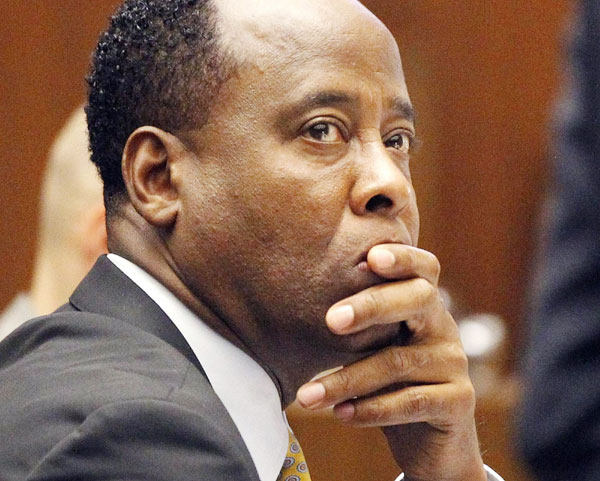Jackson begged for help sleeping
 0 Comment(s)
0 Comment(s) Print
Print E-mail
China Daily, October 8, 2011
E-mail
China Daily, October 8, 2011
|
|
|
Dr. Conrad Murray, who was in-house doctor for the late pop star Michael Jackson, sits in court during his trial in Jackson's death in Los Angeles October 7, 2011.[Photo/Agencies] |
Michael Jackson's doctor told police he left the "Thriller" singer for about two minutes after giving him the anesthetic propofol for sleep and returned to find Jackson no longer breathing.
In a dramatic audio recording of Dr. Conrad Murray's police interview two days after Jackson's June 25, 2009 death, the Grenada-born physician calmly describes how the pop star enlisted Murray to help him sleep with propofol on a regular basis and says Jackson called the anesthetic his "milk."
The two-hour tape was played publicly in its complete form for the first time on Friday at Murray's trial in Los Angeles on manslaughter charges.
A detective has previously testified that during the interview, Murray said he administered a half-dose of the surgical anesthetic that killed Jackson, and that he had been trying to wean the entertainer off the drug.
LAPD Det. Scott Smith testified that the interview took place in a small office next to a banquet hall at the Ritz-Carlton Hotel in Marina del Rey. Music, rustling and chatting can be heard in the background.
In the recording, detectives told Murray that the interview would be used to assist the coroner in determining a cause of death for Jackson.
Murray's account to police of how long he left Jackson's bedside differed from evidence presented by prosecutors at the two-week old trial. Authorities have determined Jackson died of an overdose of propofol combined with sedatives.
Murray said he gave Jackson propofol at around 10:50 a.m. on June 25, after trying to get him to sleep with sedatives all night and after Jackson begged for the drug.
"Please, please give me some milk, so I can sleep," Murray quoted the singer as saying.
"I watched him for a long enough period that I felt comfortable, then I needed to go to the bathroom so I got up and went to the bathroom," Murray told detectives.
"Then I came back to his bedside and was stunned in the sense that he wasn't breathing," Murray added.
JACKSON'S IDEA, DOCTOR SAYS
Prosecutors at trial presented phone records showing that Murray made and received a series of cell phone calls between 11:07 a.m. and shortly before noon, when they believe he discovered that Jackson was no longer breathing.
Murray, who was hired to care for Jackson as he prepared for a series of London comeback concerts, told police, it was at Jackson's urging that he began giving him propofol for sleep.
Jackson knew how to administer propofol himself, saying he liked to sleep for 15-18 hours a day, but Murray told police he didn't allow him to.
However, he gave the singer propofol for sleep nearly every day for two months before the pop star's death but claimed he was trying to wean Jackson off it.
"After joining his team, I fell into a situation of caring for a gentleman who wanted regular, daily Diprivan," Murray told police, using a brand name for propofol. "That was not my purpose for joining his team."
The physician's attorneys say Jackson caused his own death by giving himself another dose without Murray's knowledge.
Until now, Murray has been a silent figure in the trial, writing notes and whispering to his team of attorneys as the prosecution details its case against him. He faces up to four years in prison if convicted.
In the first two weeks of the trial, prosecutors have portrayed Murray as a man who ordered vast quantities of prescription drugs for Jackson but who failed to monitor the singer properly, and then tried to hide some of the drugs on the day Jackson died before calling an ambulance.






